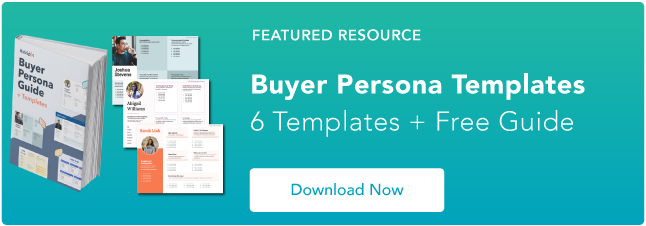 Imagine that you’ve been invited to the birthday party of a distant cousin you haven’t seen in over a decade. You know her age, gender and what she does for a living, but not much more than that.
Imagine that you’ve been invited to the birthday party of a distant cousin you haven’t seen in over a decade. You know her age, gender and what she does for a living, but not much more than that.
With this information, how will you go about buying the perfect birthday present for her?
Contrast that with the idea of buying a gift for a dear friend whose thoughts, interests and preferences you know, and you’ll see how important it is to understand the recipient on an intimate level when selecting a present. Sure, you might come up with a good-enough gift idea without knowing more than the basics, but it takes more than that to come up with something truly extraordinary that will delight the recipient.
The same idea holds true when marketing and selling your products. If you only have a surface-level understanding of your target customers, your ad copy and marketing materials will be aimed at an unnecessarily broad audience. But if you really dig down and get to know your would-be buyers on a deeper level, you’ll find it much easier to craft the kind of tailored, laser-targeted messaging that practically compels them to buy.
What Are Buyer Personas? A Quick Review
The secret to getting to know your prospective customers in sufficient detail is the buyer persona, which HubSpot defines as “a semi-fictional representation of your ideal customer based on market research and real data about your existing customers.”
To kick off the market research process and help you craft the ultimate buyer persona, I’ve compiled a list of 100 questions that will help you get to know your target buyer. While you don’t have to answer them all, gathering details on as many of them as possible will give you the information needed to write high-converting copy, as well as give you an edge over competitors who haven’t gone to such lengths to understand your shared audience.
(Note: To keep things simple, I’ve referred to the buyer persona in question as male, though the information is equally applicable to female customers. Feel free to adapt the pronouns as needed to suit your target audience.)
100 Questions to Create Your Buyer Persona
Background and Early History
1) What is his name?
2) What is his age?
3) What is his gender?
4) Where was he born?
5) Where did he grow up?
6) Did he grow up in a rural, suburban, or urban area?
7) What kind of house did he live in growing up?
8) What did his mom do for a living?
9) What did his dad do for a living?
10) Are his parents still married?
11) Did his parents have a permissive parenting style, an authoritarian parenting style, or somewhere in the middle?
12) Does he have any brothers or sisters?
13) Where does he fall in the birth order?
14) What is his racial/ethnic heritage?
15) What were his favorite activities as a child?
16) What are his favorite childhood memories?
Education
17) What type of elementary, middle, and high schools did he attend?
18) What was his favorite subject in school?
19) What types of grades did he get in school?
20) Does he enjoy learning new things?
21) Did he have a lot of friends, a few close friends, or no friends at all?
22) Did he get in trouble at school?
23) Did he attend college?
24) If so, where did he go?
25) What did he major in?
26) Did he enjoy his college experience?
27) If he did not attend college, what did he do after high school?
Employment History
28) What was his first job?
29) What is his current job?
30) How did he arrive at his current position?
31) How long does he stay in a given job, on average?
32) What is his current salary?
33) Does he feel he’s compensated fairly?
34) Does he like his boss?
35) Does he like his coworkers?
36) Does he like the work he’s assigned?
37) What challenges does he face in his current position?
38) What is his dream job?
39) How does he plan to pursue this job (if he plans to do so at all)?
40) When does he plan to retire?
Current Situation
41) What city does he currently live in?
42) What type of housing does he currently live in?
43) Who lives in his house with him?
44) Is he happy with his current arrangement, or does he wish it was different?
45) Is he close to his extended family?
46) Does he have any pets?
47) Is he single, dating, or married?
48) Is this the relationship status he would prefer? (For example, is he single by choice or because he hasn’t yet found a suitable partner?)
49) Does he currently have many friends, a few friends, or no friends at all?
50) Does he enjoy traveling?
Finances
51) What is his net worth?
52) Does he have debt? (If so, what type?)
53) Does he make purchase decisions carefully or is he loose with his money?
54) How does he feel about his current spending habits?
55) What factors drive him to make a purchase?
56) Is he a financial decision-maker in his current job?
Personal Life
57) What is his sexual orientation?
58) Is he religious?
59) What is his political orientation?
60) Does he make an effort to stay fit and healthy?
61) Does he care about his personal appearance?
62) What hobbies does he currently pursue?
63) What is his favorite TV show?
64) What is his favorite movie?
65) What type of music does he listen to?
66) Is he a morning person or a night owl?
67) What does he do first thing in the morning?
68) Does he cook at home or eat out?
69) Is he a neat freak or is he okay with messes?
70) How does he spend his weekends?
71) Where does he shop?
72) Does he read for fun?
73) Does he drink?
74) Does he smoke?
75) Does he experiment with recreational substances?
76) What does he wish was different about his weekly routine?
77) Is he tech-savvy?
78) What social networks does he spend time on?
Thoughts, Feelings, and Motivations
79) Is he an introvert or an extrovert?
80) Is he optimistic or pessimistic?
81) Is he more right-brained or left-brained?
82) Is he quiet or boisterous?
83) Is he practical by nature or prone to flights of fancy?
84) Does he prefer to follow the rules or enjoy situations where he can challenge boundaries?
85) Does he like to take risks or play it safe?
86) Is he an innovator or somebody who tends to go with the flow?
87) Is he flexible or rigid in his thought patterns?
88) Is he spontaneous or does he prefer pre-determined plans?
89) Is he motivated by his own achievements or by what others think of his efforts?
90) How affected emotionally is he by other people’s judgments?
91) What would it take for him to deem his life a success?
92) What would make him think his life was a failure?
Business Insight
93) What objections does he have to your product?
94) How can you help solve his unique challenges?
95) How does your product help him become his ideal self?
96) How does he prefer to communicate?
97) Is he comfortable making online payments?
98) Is he concerned about online privacy?
99) How can you meet his needs through onboarding?
100) What factors might make him choose a competitor’s product over your own?
Pay particular attention to the questions above that ask how the buyer feels, as well as those in the “Thoughts, Feelings, and Motivations” section. The answers to these queries will help you identify the appropriate marketing approach to take with your target customers.
In addition, the questions in the “Business Insight” section will reveal important objections that must be countered in your sales copy in a way that’s consistent with the understanding of the buyer you’ve developed through the rest of your market research.
Answering even half of these questions should give you the deeper understanding of your prospective customer needed to put together effective marketing materials.
But don’t treat this list as definitive as it is. Add your own questions over time or cross out those that you find aren’t useful when it comes to building your company’s unique ultimate buyer persona and reaping the rewards that come along with this newfound understanding.
What other questions would you add to this list? Share your ideas in the comments below!
![]()


